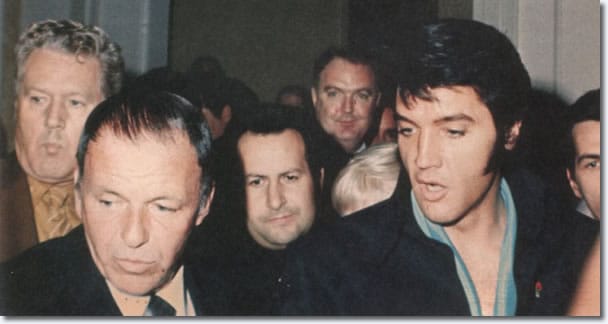Frank Sinatra – “In The Wee Small Hours”: 70 Years Of A Masterpiece. Chapter 15 – “Dancing On The Ceiling”
In the stillness of the early hours, when the world sleeps and only echoes of what could have been remain, Frank Sinatra transforms an empty room into a floating stage where love—or its ghost—still dances. This is “Dancing On The Ceiling,” that 1930 gem written by Rodgers & Hart which Sinatra recorded in 1955 for “In the Wee Small Hours”, an album that feels like flipping through the private diary of a man staring at the ceiling, wondering where it all went wrong.
The song isn’t about parties or euphoria—it’s a lucid dream, a sweet and sad hallucination. “The world is lyrical / because a miracle / has brought my lover to me,” Sinatra sings, though we know—just as he does—that she isn’t really there. She’s just a shadow, projected onto the plaster like an old film reel playing on loop every night. “I try to hide in vain / beneath my counterpane” he confesses, but love—when it’s real (or when it hurts this much)—doesn’t hide. It floats. And in this case, it dances.

Sinatra’s genius lies in how he turns a melody that could’ve been cheerful—almost an ethereal waltz—into a confession of defeat. His voice, wrapped in Nelson Riddle’s string arrangements, doesn’t sing—it whispers. As if he’s afraid of waking that imaginary woman twirling above his bed. “I whisper, ‘Go away, my love / It’s not fair,’ ” but in truth, he’s begging her to stay. Because even a ghost is better than nothingness.
This song wouldn’t be the same without the context of the album. “In the Wee Small Hours” is a journey through the stages of heartbreak—denial, anger, nostalgia—and “Dancing On The Ceiling” arrives just as the pain begins to morph into poetic resignation. It’s no accident that it follows “It Never Entered My Mind” (where the narrator admits his mistakes) and precedes “I’ll Never Be The Same” (the acceptance that love has changed him forever). Here, in this interlude, the protagonist no longer weeps—he smiles, even if sadly, watching his lover—even if just a mirage—still alive in his dreams.
Rodgers and Hart wrote lyrics that play with the paradox of unrequited love: “I love my ceiling more / since it is a dancing floor / just for my love.” That line says it all. The ceiling—a cold, impersonal place—becomes sacred because she inhabits it. And Sinatra, with his flawless phrasing, makes even pain sound beautiful. As if saying “I miss you” with elegance somehow makes it less devastating.
Today, nearly a century later, the song still resonates. Maybe because we’ve all, at some point, seen someone dancing on our ceiling. Someone who’s no longer here but refuses to leave completely. And therein lies the magic: Sinatra isn’t singing about lost love, but about how we reinvent it to survive.

If you want to visit more articles about the life of Frank Sinatra enter the following Sinatra Radio 24h link: https://sinatraradio24h.com/category/articles/
We remind you that you can also listen to Sinatra Radio 24 hours on your mobile phone by downloading our free applications for Android in the Play Store https://play.google.com/store/apps/details?id=sinatra.radio24h for iPhone in the Apple Store https://apps.apple.com/app/sinatra-radio-24h/id6599859344









